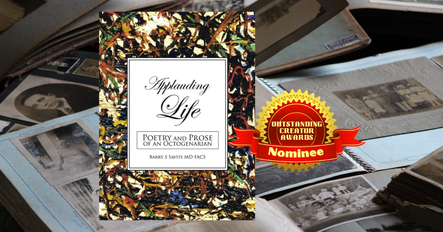|
Score: 95/100 (9.5 out of 10)
What a phenomenal, incredible book of poetry and prose from the mind and life of an extraordinary person! Applauding Life by Barry S. Savits, MD is surprisingly long for a poetry book at a hefty 400+ pages, but it never overstays or outstays its welcome. This is a dense, complex book with a lot to say and explore. It is, without a doubt, substantial and significant in a way rivaled only by the works of previous winners like Anthony Toomer and Mike Cook. Let's dive into this incredible book! This book has a feeling out period in the first hundred or so pages. That's more typical of something like a fantasy novel than a poetry book. Many of the better poems like “Photos” and “Only Human” are near the middle and end. However, that's not to say that the first hundred pages are dull or uneventful. Actually, the first hundred pages really introduce you to the character and extraordinary circumstances of the writer. Get this: the author literally became a doctor because there were no other doctors in town who could perform a life-saving surgery on his mother. He had to step up and do the surgery based on things he read and diagrams he saw. WOW! Could you imagine being in his shoes? Any of us would be sweating bullets! But that's the kind of person this writer is: they're a go-getter and a survivor who will do whatever it takes. There are few things more admirable and inspirational than that. There are a few mundane poems in this first half of the book including one about a bird and one about a door. However, the author is able to make these mundane things interesting to us. These simple things are actually rather complex concepts. A bird who ventures away from her young to find food or a “friend” must have a story to tell, especially when it then chooses to ignore its new “friend” in favor of its young. A door is more than a rectangular slab of painted wood or steel with a knob, it's a separation that could divide two people or open a pathway in a wall to bring them together. This first half is really about the writer finding and piecing together themselves. The writer, it turns out, is not just a doctor who performed surgery on his own mom, he's also Jewish and gay—a gay Jew who spent years wrestling with these feelings and paradoxes at a time when it was far less acceptable to be anything other that heterosexual. Oh, yeah, he also served in the Navy and participated in the Vietnam War. So, this guy's life is the stuff of legend. Sprinkled throughout this back like red checker marks on a checkerboard are little stories and what-if scenarios that sarcastically pick apart historical and literary figures/events like the Spanish Inquisition, Christopher Columbus, and Hamlet by Othello. There is one clever, poetic piece regarding a figurative chess match between Aphrodite and Ares (love and hate). There's a section in here in which the writer reflects on the binding of Isaac and compares Abraham's knife cleverly to the knife (scalpel) he chose as a doctor. There's also a rather impressive collection of haikus in here. But let's talk about what we want to talk about: the hard-hitting, jaw-dropping poems that hit about 3/4ths of the way into this book. The best of these is arguably “Photos.” Just look at the elegance of these excerpts: “...run the gauntlet of possibilities” “...siren songs of my beginnings” “...whispers of my past” And perhaps the best line in the book: “Those who make memories possible are not dead or far away. They are just sleeping silently. Awaiting being remembered to awake...” The poem “Only Human” also contends for the #1 spot in this book. It makes impressive use of anaphora, repeating the phrases “If I were” and “As a/an” at the beginning of each line. The writer continues to use alliteration as in “As a bird, I would sing sweet summer songs.” There's powerful subtext to all of that too. All of these comparisons to things like bells and animals are drawing attention to the fact that the writer (and readers) are human beings—human beings with something that makes them unique: a voice with which to speak and use language. Ultimately: “As a simple human being, I speak in words” How about this beautiful line from the poem titled “Place”: “The tumultuous world raged outside.” Now, this book isn't perfect. There are especially some issues with wrong-word usage such as “magna” instead of “magma” in the context of a volcanic eruption or “breach the canyon” instead of “bridge the canyon.” The almost-perfect line “repair this broken agenda,s[sic]” is ruined by the typo at the end of it. We'll conclude by going over probably the best theme in the book: the perseverance and freedom of ideas and defending them in language. A lot of this book concerns the use of “voices” to spread ideas and the “process of absorption and digestion of ideas.” The writer warns that the destruction of ideas and varied views (“no need for human oriented news”) would lead to “No humans, only wasteland, only ashes.” Check this out on Amazon!
0 Comments
Leave a Reply. |
Archives
July 2024
Categories |

 RSS Feed
RSS Feed